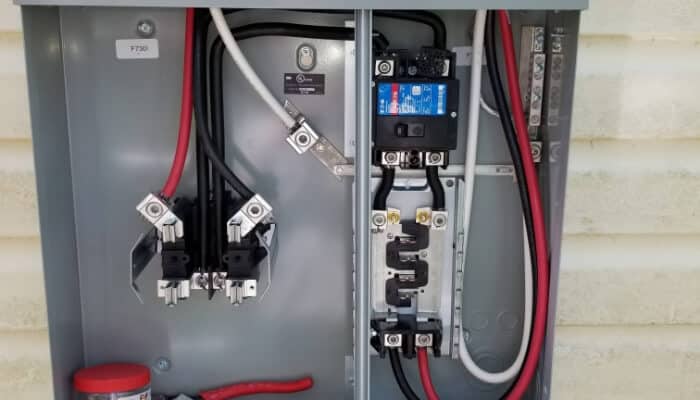
Understanding the Importance of Your Electrical Panel
As a Georgia homeowner, ensuring the safety and efficiency of your electrical system is paramount. Your electrical panel serves as the core component of your home's electrical infrastructure, facilitating the safe and efficient distribution of power. However, over time, electrical panels can become outdated or faulty, necessitating a replacement to maintain optimal functionality and safety.
We'll explore the significance of electrical panel replacement, the importance of budget planning for this project, and provide valuable insights into the process.
Signs That Indicate the Need For Panel Replacement:
- Dimming or flickering lights
- Frequently tripped circuit breakers
- Burning odors near the panel
- Outdated panels unable to handle modern electrical demands
Importance of a Well-Functioning Electrical Panel
Your electrical panel is responsible for regulating the flow of electricity to various circuits in your home. A malfunctioning panel can lead to power outages, electrical fires, and other safety hazards. Therefore, ensuring that your electrical panel is in good working condition is crucial for the overall safety and efficiency of your home.
Electrical Panel FAQS
On average, however, a straightforward panel replacement can take anywhere from four to eight hours. The duration of an electrical panel replacement project can vary depending on factors such as the size of your home, the complexity of the electrical system, and whether any unforeseen issues arise during the process.
Yes, in most cases, you will need a permit for electrical panel replacement. Local building codes and regulations typically require permits for electrical work to ensure that it is done safely and up to code. Consult a licensed electrician to determine the specific permit requirements for the Cartersville, GA area.
Yes, it is possible to upgrade your electrical panel without rewiring your entire house. However, this will depend on the condition of your existing wiring and whether it meets current electrical standards. A qualified electrician can assess your wiring and recommend the best course of action for upgrading your electrical panel while ensuring the safety and functionality of your home's electrical system.
Here in the Cartersville, GA area, you can expect to pay anywhere from $1,000 to $3,000 for a standard panel replacement.
Understanding the Budgeting Process
Before embarking on your electrical panel replacement project, it's essential to understand the budgeting process and factors that will influence the overall cost.
Factors Influencing the Budget
Several factors can impact the cost of replacing your electrical panel.
- Size of the property: Larger properties may require more extensive electrical work, impacting the overall budget.
- Complexity of the electrical system: Older homes with outdated wiring may necessitate additional upgrades, leading to higher costs.
- Local regulations and permit costs: Obtaining permits and adhering to local building codes can incur additional expenses.
- The type of panel being installed.
Planning ahead is key to avoiding unexpected expenses and ensuring that you have adequate funds to complete the project. By carefully considering your budget priorities and researching costs upfront, you can make informed decisions and avoid costly surprises down the line.
Initial Assessment and Cost Estimation
The first step in planning your electrical panel replacement budget is to conduct an initial assessment of your current electrical system and obtain cost estimates from qualified electricians.
Hiring a Professional Electrician for Assessment
It's essential to hire a licensed and experienced electrician to assess the condition of your electrical panel and provide recommendations for replacement. A professional assessment will help you understand the scope of the project and identify any potential challenges or issues that may affect the cost.
Factors Affecting the Cost Estimation Process
- The size and location of your electrical panel
- The accessibility of the installation site
- Any additional work required to bring your electrical system up to code
Be sure to discuss these factors with your electrician to ensure an accurate cost estimate.
Setting Your Budget Priorities
Once you have obtained cost estimates for your electrical panel replacement project, it's time to set your budget priorities and determine where to allocate your funds.
Identifying Essential Upgrades Versus Optional Ones
When setting your budget priorities, it's essential to distinguish between essential upgrades that are necessary for the safe and efficient operation of your electrical system and optional upgrades that may enhance convenience or aesthetics. Focus on addressing critical issues first before considering optional upgrades.
Allocating Funds for Unexpected Expenses
It's also important to set aside a contingency fund to cover any unexpected expenses that may arise during the course of the project. Unexpected issues such as hidden wiring problems or structural modifications can quickly eat into your budget, so it's wise to plan for contingencies from the outset.
Researching Costs and Gathering Quotes
With your budget priorities established, it's time to research costs and gather quotes from suppliers and contractors for the necessary materials and labor.
Don't settle for the first quote you receive. Instead, take the time to shop around and compare prices from multiple suppliers and contractors.
Look for reputable companies with a track record of quality workmanship and competitive pricing. But please remember, the lowest cost will not always be the best option. You are getting what you pay for. If it sounds too good to be true, it may cost you more in the long run.
Negotiating for Better Deals
Once you've gathered several quotes, don't be afraid to negotiate for better deals. Many suppliers and contractors are willing to offer discounts or price matching to win your business, so don't hesitate to ask for a better deal if you feel that the initial quote is too high.
Exploring Financing Options
If you're unable to cover the full cost of your electrical panel replacement project out of pocket, don't worry. There are several financing options available to help you spread out the cost over time.
Loans, Grants, and Other Financial Assistance Programs
Depending on your financial situation and credit history, you may qualify for a variety of financing options, including personal loans, home equity loans, or government grants and assistance programs. Explore all of your options carefully and choose the one that best fits your needs and budget.
Evaluating the Pros and Cons of Each Option
Before committing to a financing option, be sure to carefully evaluate the pros and cons of each. Consider factors such as:
- Interest rates
- Repayment terms
- Any associated fees or penalties
Choose the option that offers the most favorable terms and fits comfortably within your budget near Alpharetta, Canton, Cartersville and Acworth.



